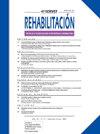[covid -19后功能状态量表:评估者给药版本与自评版本在covid -19后综合征患者中的一致性]。
Q3 Medicine
引用次数: 0
摘要
诊断为COVID-19的患者可能出现被称为COVID-19后综合征或长COVID的后遗症,其中身体、心理和/或社会并发症很明显。本研究的目的是评估评估者给药版本的covid -19后功能状态量表(PCFS)与患者自我评估的covid -19后患者的一致性。方法:对确诊后康复的COVID-19患者进行观察性研究。一旦项目获得伦理委员会的批准,患者签署知情同意书,就开始进行调查,收集社会人口统计学和临床数据,并应用PCFS量表,有两种形式,一种是自我管理的,另一种是由评估者管理的。结果:97例患者入组,其中57.7%为女性。一致性分析确定一致性指数为0.857,95% CI(0.7 ~ 0.934)(几乎完全一致)。女性的一致性为0.817 95% CI 0.700-0.934,男性为0.907 95% CI(0.806-1)。结论:卫生专业人员编制的西班牙语版PCFS量表与患者自行评定的PCFS量表比较,显示出充分的一致性。本文章由计算机程序翻译,如有差异,请以英文原文为准。
Escala de estado funcional post-COVID-19: concordancia entre la versión administrada por evaluador versus autoevaluada en pacientes con síndrome post-COVID-19
Introduction
Patients diagnosed with COVID-19 may present sequelae which are called Post COVID-19 Syndrome or Long COVID in which physical, psychological and/or social complications are evident. The objective of this study was to evaluate the agreement of the Post-COVID-19 Functional Status Scale (PCFS) of the evaluator-administered version vs patient self-assessed in post-COVID-19 patients.
Methods
Observational study in patients diagnosed with COVID-19 with subsequent recovery. Once the project was approved by the ethics committee and the patients signed the informed consent, a survey was carried out to collect sociodemographic and clinical data and the application of the PCFS scale, in its two forms, self-administered and by an evaluator.
Results
97 patients entered the study, 57.7% being women. The agreement analysis determined a concordance index of 0.857 95% CI (0.7-0.934) (almost perfect agreement). The agreement for women was 0.817 95% CI 0.700-0.934 and for men 0.907 95% CI (0.806-1).
Conclusion
The use of the Spanish version of the PCFS scale carried out by the health professional compared to the version self-assessed by patients, demonstrates adequate agreement.
求助全文
通过发布文献求助,成功后即可免费获取论文全文。
去求助
来源期刊

Rehabilitacion
Medicine-Rehabilitation
CiteScore
0.80
自引率
0.00%
发文量
63
期刊介绍:
La revista que es desde hace más de 40 años la publicación oficial de la Sociedad Española de Rehabilitación y referente de la mayoría de las Sociedades de la Especialidad de los países americanos de habla hispana. Se publican 5 números pluritemáticos al año y uno monográfico sobre un tema del mayor interés y actualidad designado por el consejo de redacción.
 求助内容:
求助内容: 应助结果提醒方式:
应助结果提醒方式:


